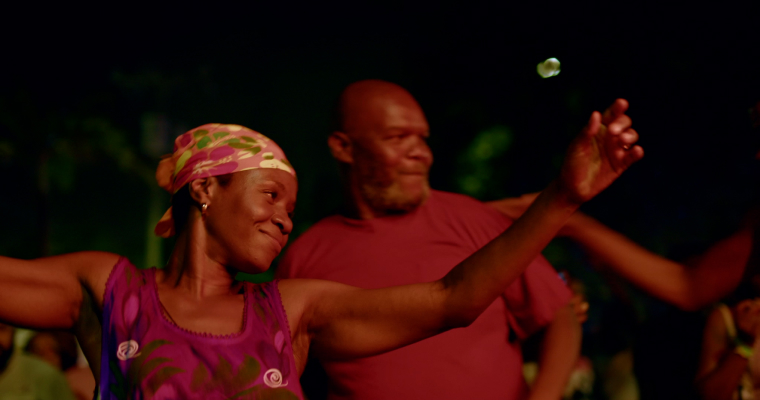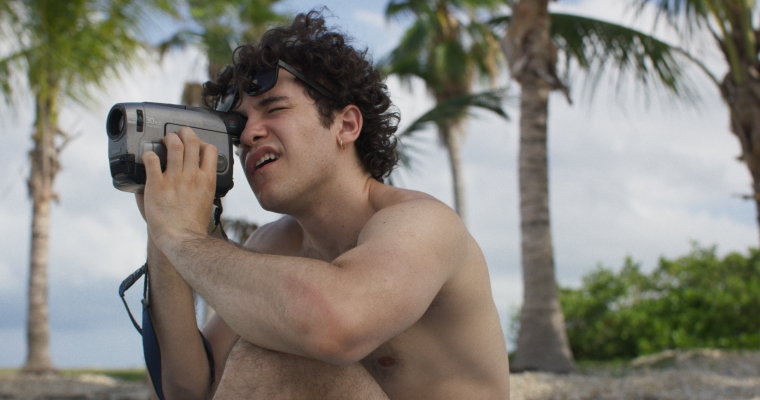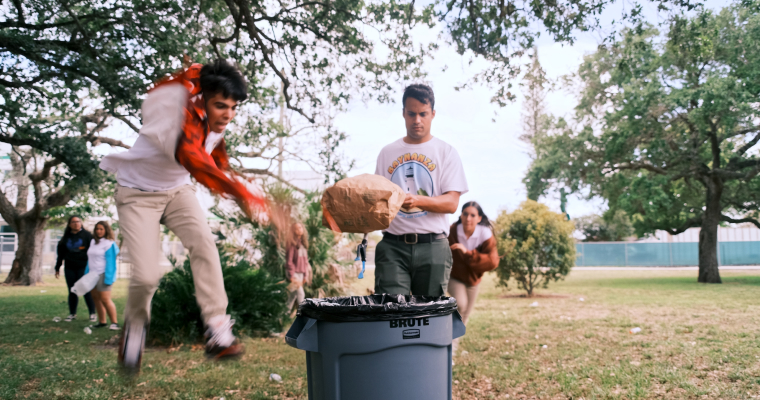
Atibon Nazaire as Xavier and Sheila Anozier as Esperance in a scene from "Mountains." (Courtesy of MDC's 41st Miami Film Festival)
The vibes were pleasant, the drinks flowed freely, and the screen was an inflatable device. The folks running the Miami Film Festival gave South Florida's arts community a first taste of its currently unspooling lineup at a mellow and breezy shindig on the roof of the Mayfair House Hotel & Garden in Coconut Grove on March 4.
The occasion served as a coming out party for James Woolley, the festival's new executive director. The newest team member, alongside director of programming Lauren Cohen, wasted no time in touting the more than 180 films from more than 30 countries hitting screens across Miami-Dade County through Sunday, April 14.
[RELATED: Here's What's Happening at the Miami Film Festival]
Woolley proclaimed the beginning of a fun and carefree chapter for the long-running South Florida staple, reflected in the cartoonish and playful poster art. The announcement marked a symbolic turning of the page, away from the event's more than occasionally tumultuous and messy past.
Which is all well and good, but the proof is in the pudding, and with the exception of a few high-profile premieres, the word that comes to mind when describing this year's lineup is serviceable. Sure, many cinephiles are justly excited at, say, the opportunity to see “Close Your Eyes,” the (still unseen by me) first feature from “Spirit of the Beehive” director Victor Erice in three decades. Alas, such highlights are few and far between.

Sheila Anozier as Esperance and Atibon Nazaire as Xavier in a scene from "Mountains." (Courtesy of MDC's 41st Miami Film Festival)
Consequently, I've decided to keep it local this year, and limit my coverage to three made-in-Miami films helmed by local filmmakers. Two of them are making their world premieres this weekend, and the other is coming home after a successful festival run and considerable acclaim. Do they measure up to the buzz? It's time to find out.
“Mountains”: The face of Little Haiti is changing, one bulldozed home at a time. Gentrification is a pressing matter for this vibrant community, but this quietly observant drama tackles the subject, not in direct, issue-driven fashion, but by chronicling the effect it has on a nuclear family.
The patriarch is Xavier (Atibon Nazaire), a construction worker tasked with overseeing the demolition of the homes in his neighborhood. His wife Esperance (Sheila Anozier) is a seamstress and a crossing guard at a local school. Whereas Xavier dreams of finding a bigger home than their humble abode, Esperance has her feet firmly planted on the ground (and has exquisite fashion sense), aware that home is not just a roof over their heads but a state of mind.
Then there's Junior (Chris Renois), a college dropout who still lives at home and parks cars for a living, much to his father's disappointment. But what Mom and Dad, who left Haiti in search of a better life many moons ago, don't know is that Xavier Jr. is also an up-and-coming stand-up comedian. It's an aspiration that, he intuits, will be lost in translation if he were to share it with his parents.

Chris Renois as Junior in a scene from "Mountains." (Courtesy of MDC's 41st Miami Film Festival)
The elements are all in place for a kitchen sink drama that could zero in on this household's intergenerational fissures to create conflict, but that's not the way director Monica Sorelle rolls. The Haitian American filmmaker, here making an assured feature directing debut, allows scenes to unfold in an organic, matter-of-fact fashion. Small talk shapes the characters' conversations with such lived-in authenticity that it's not until the film is over that you realize how much character detail the director, working from a screenplay she co-wrote with producer Robert Colom, has been able to insert almost imperceptibly.
With its mixture of naturalism and understated lyricism, even an inspired dash of magic realism, “Mountains” follows a familiar arc and does feel more than a little granola, but the exchanges between father, mother and son never hit a false note. The film also boasts a strong sense of time and place, with an accomplished use of locations, not just Little Haiti but Miami Beach and North Miami, that respects Miami-Dade's geography and contributes to the sense we're witnessing a pocket of real life play out before us.
“Mountains” yearns for the enchantment (and topography) of a Caribbean motherland that's just out of reach, and it mourns a present that is shifting much too quickly for so many of us to find our bearings. Sorelle, who picked up the Someone to Watch Award at this year's Independent Spirit Awards, aims to etch a portrait of cultural displacement and the increasingly elusive nature of the American dream, and she has the patience and skill to pull it off.

Ramiro Batista as Alex in a scene from "Fallen Fruit." (Courtesy of Fallen Fruit)
“Fallen Fruit”: The old adage “you can't go home again” gets a South Florida makeover in writer-director Chris Molina's debut feature. The filmmaker bends the tale of a young gay man who moves back home after living in New York City in the shape of a roman à clef. The foregone conclusion that the place where you grow up has moved on in your absence here becomes a question. Can you go home again? The answer initially seems to be thorny and complicated, setting the stage for a foray into ennui and disillusionment through a queer lens.
But the lackluster and astonishingly flavorless results show that it's not enough to write what you know. Molina strains for insight, but he saddles us with a protagonist who is not only deeply unsympathetic but rather one-note about his outlook on life and his current dilemma.
A painful breakup prompts Alex (cutie patootie Ramiro Batista) to return to the Sunshine State and to a family that is supportive but perplexed about his homecoming. Also offering support is Alex's bestie, Sam (“Summoning the Spirit's” Krystal Millie Valdes), but the film's overarching lack of specificity extends to the dearth of detail that would have made their friendship come alive.

Austin Cassel as Chris and Ramiro Batista as Alex in a scene from "Fallen Fruit." (Courtesy of Fallen Fruit)
Still nursing his wounds, Alex is unable to keep a job, not even something as innocuous as a camp supervisor. His heart is simply not into it. What does pique his interest is his dad's old camcorder, and he starts documenting the sights and sounds of the world he left behind. Could this possibly take him into a journey of self-discovery with a future career option as a visual storyteller on the horizon?
Hold that thought. Alex quite inelegantly crosses paths with Chris (Austin Cassel), and the attraction between the two young men appears to be mutual. Molina is awfully fond of “meet-cutes” taken right out of 1990s rom-coms, but his staging is so awkward that he keeps fumbling every opportunity to find his footing. He even manages to make a hookup in the bushes feel unsexy. That takes a special gift.
Molina displays little interest in generating sexual heat between Alex and Chris, and the scenes showing physical contact between the characters are muted and all too brief. Instead, he uses the threat of an STI and a slowly approaching hurricane to give “Fallen Fruit” the semblance of a narrative spine. As the film plods forward, Alex turns the video camera on himself, but the blank slate of a person staring at the lens has little of relevance to say. That's what happens when a character is strictly defined by his lack of direction. Did Molina intend viewers to give a damn about this pouting sourpuss? His “Fallen Fruit” isn't rotten, exactly, just unremittingly bland.

Daniel Lago as Mr. Ramos in a scene from "A Communist Brainwashed My Daughter." (Courtesy of MDC's 41st Miami Film Festival
“A Communist Brainwashed My Daughter”: With his big, round baby browns and boy-next-door good looks, Daniel Lago has an appealing screen presence that's well-suited to comedy. He puts Hialeah's Cuban community, with its archaic hangups and insular lack of curiosity, in his crosshairs in this satire that throws environmental awareness, male chauvinism, a dysfunctional school district and witchcraft into the Osterizer, then hits frappé. It's a big swing, one that stumbles so hard my head's still spinning.
Lago plays Mr. Ramos, a self-righteous neat freak and science teacher at a local high school. Sitting in traffic, he catches a driver throwing a plastic container from his Tacoma (with manual windows, no less). Inside the pickup truck is pest control exterminator Ediberto (Manuel Delgadillo) and his daughter Marisol (Amy Doval), one of Mr. Ramos' students. Road litter is a line in the sand for the tree hugging prof, and Lago will circle back to his character's outrage, as he cross-cuts between Ramos' spectacularly unproductive day on campus and Ediberto's visit to a lonely MILF with a stinking backyard and a high libido.
It's clear that with “Communist,” a word that denotes the way someone like Ediberto would view someone like Mr. Ramos, Lago wants to do something inventive that captures the setting with its idiosyncrasies intact. But while the filmmaker is always engaging in front of the camera, behind it is another matter entirely. He displays a bizarre mixture of ineptitude and didacticism. The scenes just lay there, shapeless and half-assed in their execution. And a sequence that pays homage to silent cinema may have looked good on paper, but on screen, it falls flatter than a pancake.

Enrique De La Osa as Rodrigo and Daniel Lago as Mr. Ramos in a scene from "A Communist Brainwashed My Daughter." (Courtesy of MDC's 41st Miami Film Festival)
Lago has crafted a self-absorbed time capsule, a feature-length lecture about being good to Mother Earth, but peppered with scatological humor. (Social commentary, with “trompetilla” farts.) It's too entrenched in its bubble to tell whether its depiction of Hialeah life will translate to anyone outside of its ZIP code. It doesn't.
The few bright spots in the modestly budgeted production are mostly linked to the portrayal of high schoolers who look and behave like actual teens. Marisol has an ongoing rivalry that borders on flirtation with her classmate Rodrigo (Enrique De La Osa). When they trade barbs, the actors hint at the movie this could have been with a sharper focus and a stronger grip on the mise en scene. Lago himself creates a character with considerable potential: Mr. Ramos is a nonconformist with shades of Gael García Bernal.
But looking for something good about this film is akin to sifting through garbage, which is not far removed from what Mr. Ramos has his students in detention do, all in the name of learning about the environment. It's at this point that “Communist” devolves into a hamfisted game of “quién es más macho,” made even more dire by a woefully ill-conceived epilogue that shoehorns rising tempers and poorly staged bloodletting into the combustible mix. It deals the killing blow to a movie that never actually manages to get its act together. Lago has made a train wreck, and it did not have to be this way.
“A Communist Brainwashed My Daughter” screens Sunday, April 6 at 2:30 p.m. at the Silverspot Cinema in downtown Miami. “Mountains” screens Sunday, April 6 at 7 p.m. at the Adrienne Arsht Center for the Performing Arts. “Fallen Fruit” screened Friday, April 4 at 7:30 p.m., with an encore screening set for Wednesday, April 10, at 9:30 p.m. at Coral Gables Art Cinema. (The festival reports this screening is sold out.) For more information about the 41st Miami Film Festival, go to miamifilmfestival.com.
 MAIN MENU
MAIN MENU

